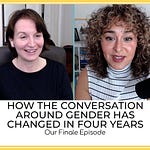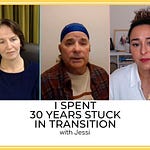Many children with ROGD seem reluctant to grow up. Sometimes this is related to the difficulties of an early puberty or the hyper-sexualization of children. Other times the gap between the Disneyfied wonder of childhood and the grim hard reality of adulthood feels unsurmountable. Sasha and Stella delve into the psychology of the fear of growing up and how elements of both transition and transgender activist dogma may further infantilize and stunt development.
Links:
Four Thousand Weeks: Time Management for Mortals, by Oliver Burkeman: Amazon.com/Four-Thousand-Weeks-Management-Mortals/dp/0374159122
“Trans Kids May Reject Family, Not the Other Way Around” Transgendertrend.com/trans-kids-reject-family-not-other-way-around/
Transparency podcast (episode with Mars Fernandez):
Youtube.com/watch?time_continue=1&v=H-7PkjWgwa8&feature=emb_logo
Rees M. “The age of menarche” ORGYN. 1995;(4):2-4. PMID: 12319855. Pubmed.ncbi.nlm.nih.gov/12319855/
Extended Notes:
People with rapid gender dysphoria are having a hard time with the process of growing up.
Children see the stress of growing up and they want so desperately to opt out of it.
If you want to get into a good college, you need all these “extra” activities, which means no one really has true hobbies anymore.
People love to stay in the fantasy world of YouTube, where many subgenres are acting younger than they are.
So much of this “drama” is fueled on the internet. Why do you get some of the biggest criticisms from people with a cartoon avatar on their profile?
Children are stuck between innocent Disney and hypersexualization. Where do you really go from here?
Stella has noticed that a lot of people who have gender issues also tend to have gone through puberty earlier than their peers.
Getting a period at seven years old is very traumatizing.
What fears do boys have about growing up?
When children have unlimited access to content, their imagination tends to dwindle, as well.
Do kids play seven minutes in heaven anymore? These innocent fun games were a vital part of being comfortable with your body.
Everything is so screen-based now. Human interaction is very low.
Adulthood seems really intimidating to a kid who has never had to interact with people. Going into a crowded room gives them anxiety.
Young, young girls are seeing a lot more porn than you might think.
When teenagers want to transition and get top surgery, it's a very difficult and vulnerable state to be in. They have to rely on mom and dad to take care of them once again.
A child has not thought things fully the way an adult parent has. The adult has gone through all the painful scenarios their child can go through.
You don’t have to dwell on certain things, but it’s important to face it, at the very least.
If you have an estranged relationship with your child, what do you do?
Doctors don’t always want you to know the truth about your body and the types of medical consequences there are when transitioning. There’s a whole movement that prevents the sharing of this knowledge.
When you ask transitioning girls who they’d like to look like, they never describe their father. They describe a “magazine model” or a K-pop star.
Kids want to rush into the medical option because they often think, “I’m an adult, you can't tell me what to do.” It's an extreme way to gain control.
If you have a kid in this situation, it might mean that they don’t feel capable in other areas of their life.
This podcast is partially sponsored by ReIME, Rethink Identity Medicine Ethics:
Learn more about our show: Linktr.ee/WiderLensPod











